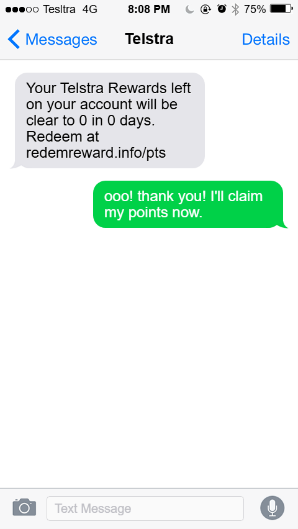Throughout October, SMS scams remained prevalent across Australia and New Zealand, with car giveaways and reward point schemes being the most common types. Read on to learn more and discover our top tips for staying safe
#1 Car Giveaways
We’ve seen a rise in car giveaway scams, with fraudsters impersonating well-known brands like Chevrolet, Ford, Toyota, Holden, and Audi. These SMS scams create urgency by telling recipients that a car lottery is about to end. Recently, scammers have shifted to imitating giveaways for performance or off-road vehicles. With the increase in new car lottery organisations, it can be challenging for recipients to determine which are legitimate.
Here are some examples to be cautious of:



Smaller organisations often offer appealing promotions to build their reputation, which scammers exploit by selling “fake tickets” to eager buyers, ultimately exposing their credit card information. Remember to proceed with caution around urgent offers and not to click on any links you aren’t familiar with.
#2 Telstra Reward Point Scams
Like other loyalty point scams, cybercriminals have continued to replicate messages from well-known brands encouraging victims to redeem loyalty points before they expire. You’ve probably seen this type of scam with other well-known brands like Coles, Flybys, Woolworths and more where a malicious website is provided through a shortened link URL. The first obvious tell-tale sign of this type of scam is a shortened URL, scammers use this tactic to hide unofficial links behind a shortened name. If you are a Telstra customer, Telstra will update you regarding your points in the “My Telstra App” or via their official website /rewards store. Telstra will not contact you via SMS or Phone to update you on your reward points.
To see other related Telstra scams read here.

What to Do if You’ve Been Scammed via SMS
• Stop all communication with the scammers immediately: Do not respond or engage further to avoid giving them more information.
• Report the scam to the National Anti-Scam Centre (Scamwatch): Reporting helps track these scams and can protect others from falling victim.
• Take corrective action on any affected accounts:
- Contact your bank to cancel compromised accounts or cards and discuss any additional security measures.
- Change your passwords for all online accounts that may be at risk, particularly those tied to sensitive information.
- Update your devices to the latest software patch, as this can help close any potential security vulnerabilities.
If you’re still unsure about what steps to take or have more questions, reach out to IDCARE.
Concerned about potential leaks of your private information? Use our free tool here to check if your email or phone number has been compromised.
